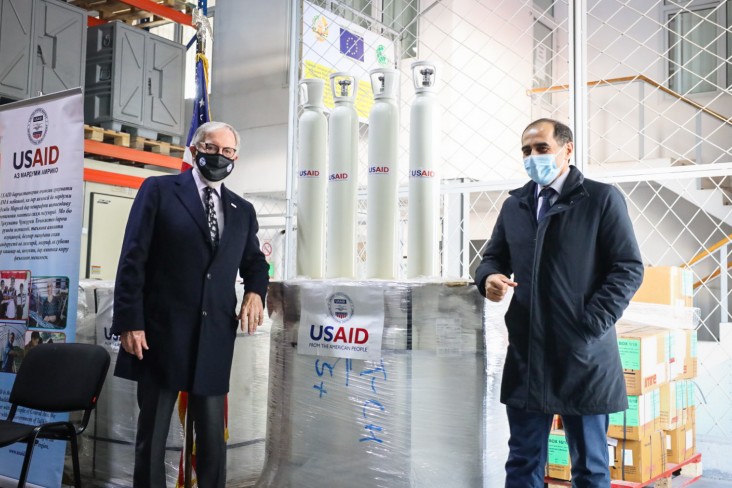You are viewing:
Archived Content
Information released online before January, 2021.
You are viewing:
Information released online before January, 2021.
Note: Content in this archive site is NOT UPDATED, and external links may not function. External links to other Internet sites should not be construed as an endorsement of the views contained therein.
You are entering the 2017-2020 Archive for the
United States Agency for International Development web site.
If you are looking for current information, visit www.usaid.gov.

Dushanbe, Tajikistan, December 29, 2020 – The U.S. Embassy in Dushanbe, through its new U.S. Agency for International Development (USAID) Mission, provided to the Ministry of Health and Social Protection the first delivery of equipment associated with a $2.6 million program to support the provision of medical oxygen for patients battling COVID-19 in Tajikistan. This oxygen support program adds to almost $5 million of medical assistance the U.S. government has already provided to Tajikistan to combat COVID-19 throughout 2020.
Acting USAID Tajikistan Mission Director Keith Simmons handed over 200 medical oxygen cylinders to the First Deputy Minister of Health and Social Protection of the Population Gafur Mukhsinzoda during a ceremony on December 29. Tajikistan is among 11 countries to receive oxygen assistance from the U.S. government, which totals $18 million dollars globally.
U.S. Ambassador John Mark Pommersheim praised Tajikistan’s efforts to prevent the spread of COVID-19 and noted, “We value our partnership with the people of Tajikistan, and we remain committed to work with the Government of Tajikistan to help respond to the COVID-19 pandemic.”
Supplemental oxygen is an essential, life-saving treatment for people infected with COVID-19. In addition to the oxygen cylinders, the U.S. Embassy will provide three advanced oxygen generation stations for installation at Tajik hospitals in the coming year.
Since the beginning of the COVID-19 pandemic, the U.S. government has provided over $7.5 million in assistance to Tajikistan to improve oxygen supply, medical laboratories and their operations, create employment opportunities for displaced workers, provide nutritional support to vulnerable communities, and more.
Comment
Make a general inquiry or suggest an improvement.